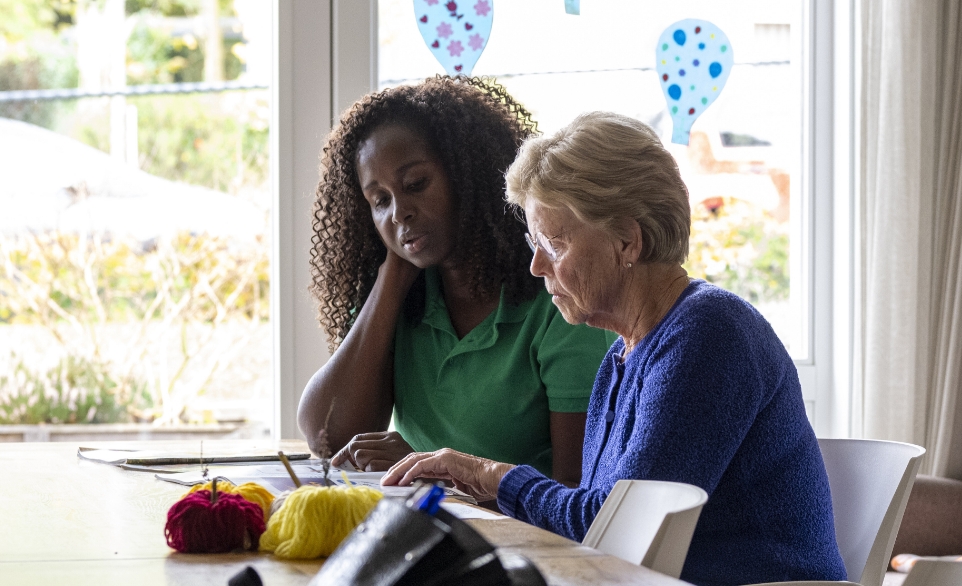
Working in care is one of the most human jobs you can do. You spend your days supporting others, listening, comforting, and providing a lifeline to people who may not have anyone else. But here’s the truth that many carers whisper about, yet rarely say out loud: while you’re surrounded by people all day, it can feel incredibly lonely.
The long hours, emotional weight, and lack of someone to talk to who truly gets it can make carers feel isolated. Yet you are not alone — thousands of carers across the UK share these feelings every day. And there are ways to find support, community, and strength so that loneliness doesn’t consume you.
For more first-hand stories, check out our Life in Care Playlist on the @bigsistercare YouTube channel.
The Hidden Loneliness in Care
On the surface, it doesn’t seem possible to feel lonely when you’re in and out of people’s homes, or working on a busy ward. But the loneliness of care isn’t about being physically alone — it’s about not having space to share your emotions.
You might be the only visitor a person sees all day, and while they may open up to you, it’s not always possible to return that honesty. You’re the professional, the one keeping it together. That can create a wall — you give, but rarely receive.
One carer told us:
“I’d spend 10 hours listening to everyone else’s struggles, but when I got home, I didn’t feel like I had anyone I could tell about mine. People outside care just don’t understand the pressure.”
Why Carers Feel Isolated
Several factors make loneliness common in care roles:
- Shift patterns: You may work evenings, weekends, or nights, while friends and family work traditional hours.
- Confidentiality: You can’t always share details of what you’ve seen or heard during a shift, which can leave you holding heavy emotions in silence.
- Nature of the role: You’re trained to put others first, but this can come at the expense of your own wellbeing.
- Lack of recognition: While the job is vital, carers often feel undervalued by wider society. That can add to the sense of being invisible.
The Impact of Loneliness
Loneliness isn’t just a passing feeling — it can impact mental health, physical health, and job performance. Carers who feel isolated are more at risk of burnout, depression, and leaving the profession altogether.
But acknowledging this reality is the first step to changing it. Being open about the challenges of care doesn’t make you weak — it makes you human.
Finding Support: You Don’t Have to Do This Alone
So how do you fight the loneliness? Here are some proven ways carers have found support:
-
Lean on Your Colleagues
No one understands care work like other carers. Even if you don’t work in the same place every day, try to build relationships with colleagues. A quick debrief over a cup of tea or a message at the end of a tough shift can make all the difference.
-
Join Online Communities
There are safe, supportive spaces online where carers connect, share stories, and lift each other up. At Big Sister, we’re building networks where you can speak freely without judgment.
-
Seek Out Supervision and Mentorship
Ask your manager for regular check-ins, not just about performance but about how you’re doing emotionally. If formal supervision isn’t offered, look for a mentor within your organisation who can guide and support you.
-
Talk to Friends and Family — Honestly
It’s easy to protect loved ones from the harder parts of your job, but letting them in can reduce feelings of isolation. You don’t have to share every detail, but even saying, “Today was really hard, I need someone to listen,” can lighten the load.
-
Invest in Yourself
Self-care isn’t just a buzzword — it’s vital. Whether it’s walking, journaling, or creative hobbies, find something that is just for you. It’s a reminder that you’re more than your role.
Case Study: Maria’s Story
Maria had been a care assistant for 18 months when she realised she was burning out. She loved her clients but felt she had no one to turn to when the sadness of loss or the weight of responsibility became too much.
She joined an online support group for carers and found herself surrounded by people who understood instantly. She said:
“It was the first time I didn’t have to explain myself. Everyone just knew what it felt like. That sense of belonging gave me the energy to keep going.”
The Power of Connection
When you’re in care, loneliness can creep in quietly. But connection is the antidote. Whether it’s a chat with a colleague, joining a peer group, or watching others share their stories, every bit of connection chips away at the isolation.
That’s why we created Life in Care. It’s not just a blog or a playlist — it’s a reminder that there’s a community of people out there who understand exactly what you’re going through.
Where to Go Next
If you’ve ever felt lonely in care, know this: you are not the only one. Your feelings are valid, and support is out there.
Head over to our Life in Care Playlist on the @bigsistercare YouTube channel to hear carers share their stories of resilience, connection, and finding support.
Don’t forget to subscribe, so you always have support in your pocket, any time you need it.
Follow @bigsisterhomecare on Instagram for ongoing updates.
Download our brochure or book a call
Because while care can sometimes feel lonely, you are never truly alone.













